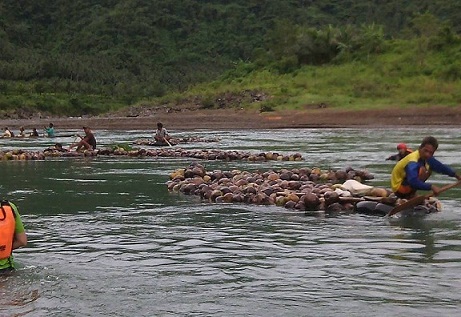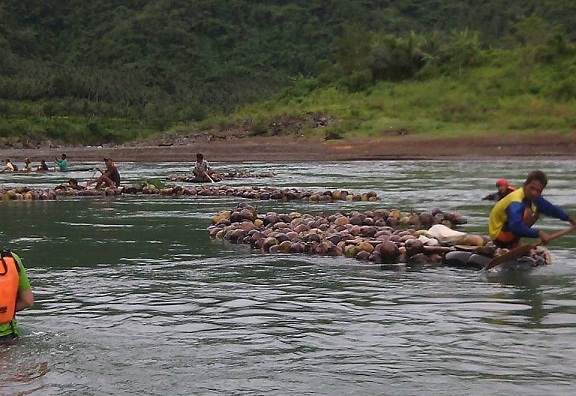By CHERRY JOY G. VENILES
Photos: UP OUTDOOR RECREATION GROUP, EGA ALCARAZ, RICHARCD ONGSICO
PAGSANGAHAN,General Nakar – “In 2004, during the big typhoon, the waters of the river rose beyond the top of the coconut trees. To get relief goods, we had to trek for four hours to the poblacion. It was hard because the trail was slippery, but it was harder not to have anything to eat. One by one the families left this place,” Bernie Coral, 43, recalls, speaking in Filipino.
Bernie is recounting to members and volunteers of the University of the Philippines’ Outdoor Recreation Group (UP-ORG) the big flood that ravaged their community in 2004.
Pagsangahan in General Nakar, Quezon Province fits the criteria that the UP-ORG has set for its community program.
The UP-ORG is a university recognized organization which engages in various outdoor activities including mountaineering. But beyond recreation it actively participates in environmental clean ups and organizes socio-economic efforts in far flung communities.
“Our criteria is straight forward,” Jacq Laruan, UP-ORG’s organizer, says. “First, the community has to be remote, no electricity and only spring water runs through the village. Second, access to the community should be at least three hours by foot, lacks basic social services such as health centers and the like and lastly, the community should not have been the recipient of an outreach program in the last three years.”
In Pagsangahan, the Kaliwa and Kanan River intersect, the Dumagat tribe lives side by side the beauty and danger of the Sierra Madre Mountains. Patches of clearing for palay and coconut trees dot the lush greens of the mountains. The river hums with the quiet laughter of children trekking for about an hour to get to Mabagkoy Elementary School.
“We have about 84 children enrolled here but only seven are in Grade 6. It gets harder to send them to school as they get older; sometimes, it’s the lack of uniform, or school supplies, but mostly because they get older and they need to help bring food to the family,” says Noemi Lyn Ritual, one of the three DepED teachers assigned in this small school.
After the big flood, the road that used to connect this small village to the rest of Nakar and Infanta was never restored. The jeeps that plied the route stopped coming and the villagers either travelled through makeshift canoes or hiked through the mountains to sell their produce. Very few students are able to get secondary education since the nearest national high school is in the next barangay, which is a two-hour walk away.
Joshua, 9, ferries passengers across the river for a few pesos to buy the supplies he needs to complete Grade 3. “Sometimes, they (passengers) don’t pay because they don’t have money. But some of them have to go to school and if they don’t ride the boat, their uniforms might get wet or they may lose their slippers in the river,” he says, in Filipino.
“This is the first time that anyone has come to us for assistance. It’s just too far. Even the NGOs that have feeding programs have refused to come here because the trek is long and tiring. So we appreciate that these mountaineers took the time to visit us with gifts for the whole community. And with gifts such as a solar panel, medicines and school supplies, I think the barangay will remember them for a long time,” Rosalia Vargas, teacher-in-charge of the school that hosted the 25 members and volunteers of UP-ORG, says.
 The group which volunteered for the Pagsangahan outreach event is a merry mix of alumni, students and mountaineer friends, an overseas Filipino organization based in Hong Kong and volunteers who were mobilized through an innocuous FB event invite. One invite, several text and email messages later, UP-ORG had enough to buy a solar panel, a TV set and some educational videos. Various donations of food, clothes, slippers, medicines, books, toys and school supplies came pouring in.
The group which volunteered for the Pagsangahan outreach event is a merry mix of alumni, students and mountaineer friends, an overseas Filipino organization based in Hong Kong and volunteers who were mobilized through an innocuous FB event invite. One invite, several text and email messages later, UP-ORG had enough to buy a solar panel, a TV set and some educational videos. Various donations of food, clothes, slippers, medicines, books, toys and school supplies came pouring in.
UP-ORG’s efforts started in the late 1990s giving medicines and old clothes to villages where the group passed during their hikes. But it was only in 2008 that it became more organized, tapping into the vast network of its alumni and other mountaineering groups that saw the dire need of these otherwise unattended quiet communities.
Each of the volunteers is requested to bring several kilos of salt, sugar, biscuits, packed food and old clothes. These are then added to the other donations and distributed to the families after a community interaction that involves playing games with children, storytelling, a feeding program and some interaction with the mothers on site.
The hike is long and the terrain can get tricky, but after crossing a few rivers, the effort of bringing in loads and loads of donations to the small school is overshadowed by the happy laughter of children. The delight on the mothers’ faces is likewise priceless.
“In my experience, they never quite forget these. Even after many years, they’d remember you as the mountaineer that made them happy even if only for a day. We inspire them and they inspire us,” Jacq notes.
For more info about UP-ORG, please visit https://www.facebook.com/UPORG1988
